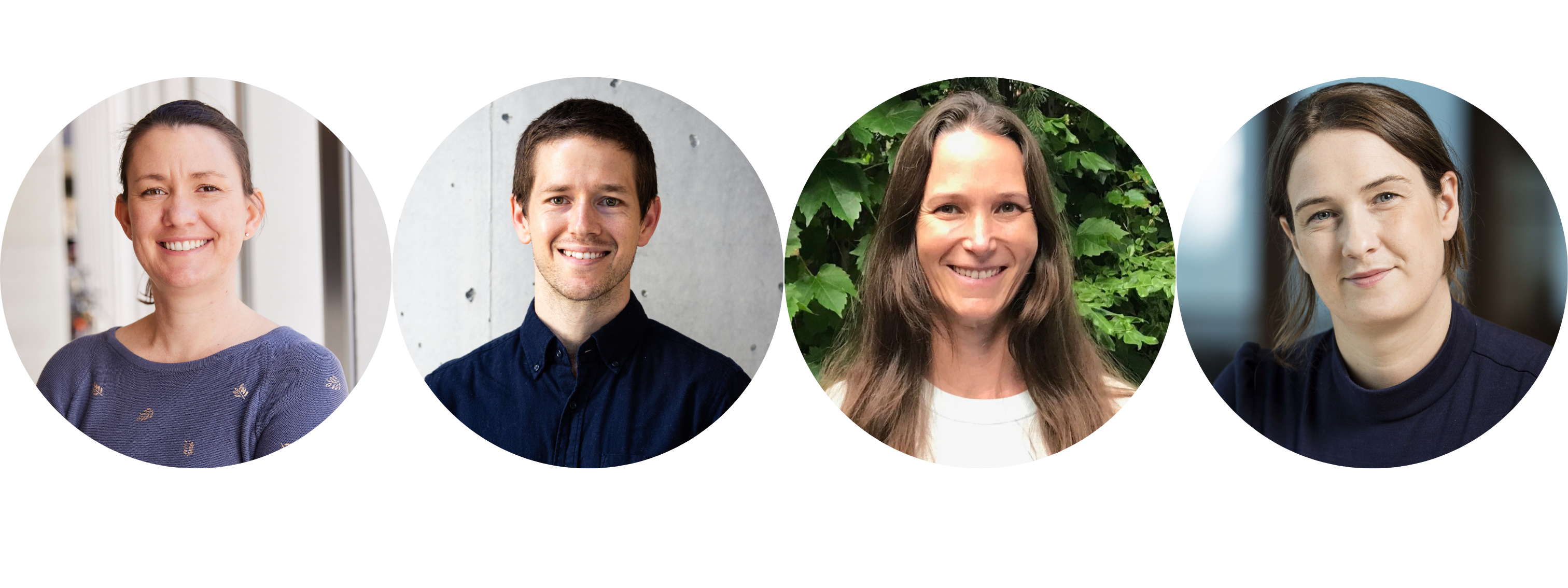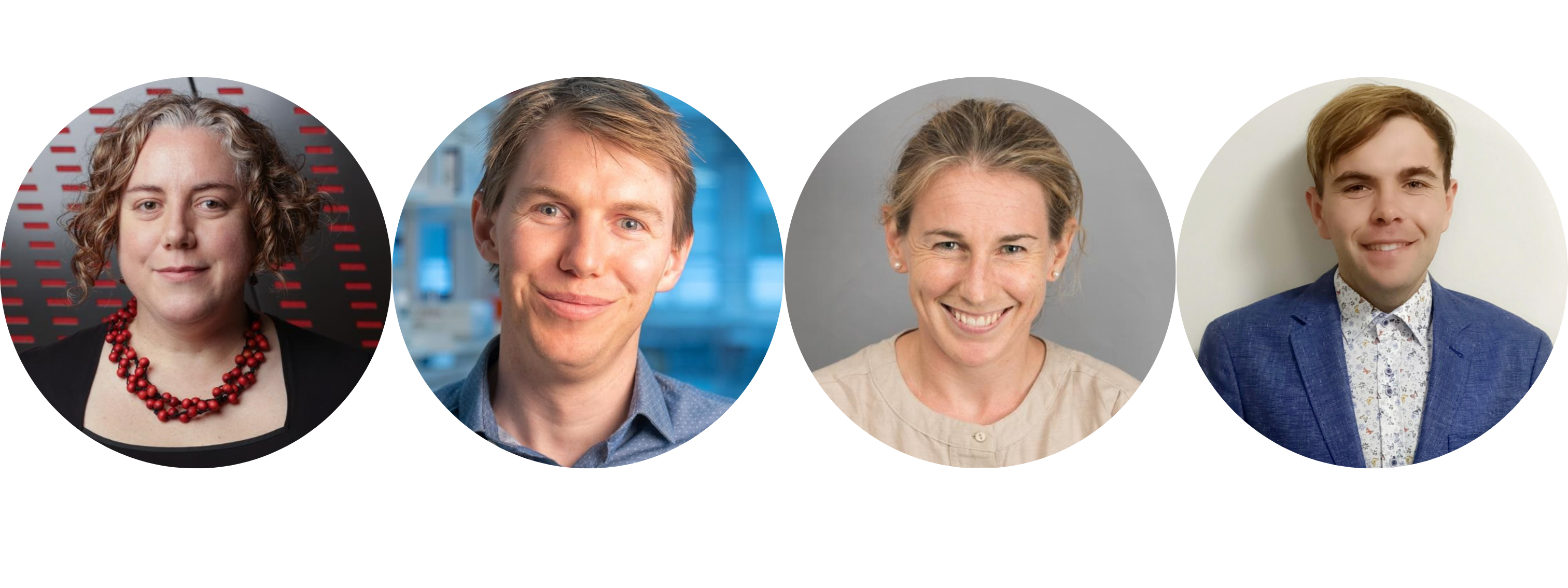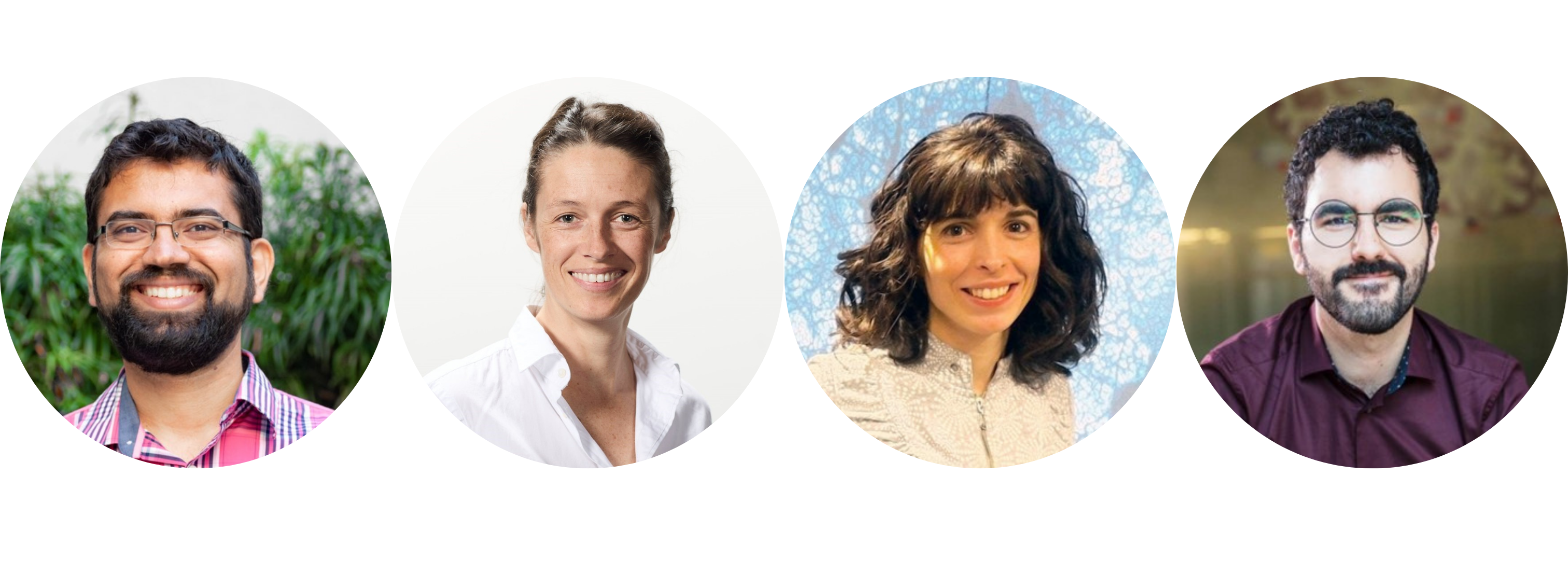Symposium Summary
The role of the microbiome and gut-brain axis in brain function and dysfunction
Chair:
Associate Prof. Ryan Anderton
Presenters:
Dr. Sarah-Jane Leigh, A/Prof. Francine Marques, Prof. Damien Keating & Prof. Anthony Hannan
Insights into neurodegenerative disease mechanisms from -omics
Chairs:
Prof. Lezanne Ooi & Dr. Tomas Kavanagh
Presenters:
Dr. Eleanor Drummond, A/Prof. Adam Walker, Prof. Scott Ayton & Dr. Rachelle Balez
Characterising the fundamental mechanisms of brain stimulation
Chairs:
Dr. Jamie Beros, Dr. Aleksandra Miljevic & Dr. Jacqueline Iredale
Presenters:
A/Prof. Susannah Tye, Dr. Joshua Brown, Dr. Li-Ann Leow & Dr. Alexander Tang
Rethinking the transition from habits to compulsivity in addictive behaviour
Chair:
A/Prof. Kelly Clemens
Presenters:
Dr. Karly Turner, Dr. Mike Kendig, A/Prof. Laura Corbit & Dr. Robyn Brown
Building blocks of neuronal function and how misplaced pieces can lead to brain diseases
Chair:
Dr. Ramón Martínez-Mármol
Presenters:
Dr. Merja Joensuu, A/Prof. Victor Anggono, A/Prof. Vladimir Sytnyk & Prof. Yazi Ke
Molecular switches in health and disease
Chair:
Professor Chris Dayas
Presenters:
Dr. Maria Kuznetsova, Dr. Annabel Short, Dr. Kelly Clemens & Dr. Chuck Herring
Developing maps of the brain - understanding how cortical and subcortical ensembles guide function
Chair: Dr. Matilde Balbi
Presenters:
Dr. Dylan Black, Prof. Lucy Palmer, A/Prof. Adam Bauer & Montana Samantzis
Chairs:
Dr. Maria Di Biase & Prof. Tony Hannan
Presenters:
Prof. Sarah Medland, Dr. Michael Clark, Dr. Fleur Garton & Dr. William Reay
New insights for the role of striatal dopamine signaling in learning and behaviour
Chair:
Dr. Thomas Burton
Presenters:
Dr. Vijay Namboodiri, Dr. Genevra Hart, Dr. Miriam Matamales & Dr. Roger Varela
Mechanisms of neurodegeneration – insights from human brain imaging
Chairs:
Dr. Jenna Ziebell & Dr. Sarah Hellewell
Presenters:
Dr. Amanda Lewis, Dr. Helen Murray, Dr. Victor Dieriks & Prof. Kay Double
Indigenous excellence in brain research
Chair:
Dr. Lizzie Manning
Presenters:
Cheryl Bridge, Dr. Jessica Buck, Gina Waters & Leigh Potter
Sensorimotor integration for motor control, motor learning, and rehabilitation
Chairs:
Dr. Li-Ann Leow & Dr. Jane Tan
Presenters:
Kara Simpson, Dr. Michelle Marneweck, A/Prof. John Semmler & A/Prof. Ann-Maree Vallence
The role of the microbiome and gut-brain axis in brain function and dysfunction
Chair: A/Prof. Ryan Anderton
A/Prof. Ryan Anderton is the Deputy Head of School, Head of Discipline, Biomedical Science, School of Health Sciences, Faculty of Medicine, Nursing & Midwifery and Health Sciences at the University of Notre Dame Australia.
Speakers

Speakers L-R: Dr. Sarah-Jane Leigh, A/Prof. Francine Marques, Prof. Damien Keating, Prof. Anthony Hannan
Symposia:
Dr. Sarah-Jane Leigh, Research Associate, UNSW, Australia
Drug-microbiota interactions underlie behavioural side effects of pharmacotherapies
A/Prof. Francine Marques, Monash University, Australia
Dietary fibre reverses adverse post-stroke outcomes in mice via short-chain fatty acids and its sensing receptors
A/Prof. Francine Marques, Head of the Hypertension Research Laboratory;NHMRC Emerging Leader Fellow;Senior Medical Research Fellow, Sylvia and Charles Viertel Charitable Foundation;National Heart Foundation Future Leader Fellow, Monash University, Australia
Prof. Damien Keating, Flinders University, Monash University, Australia
Discovery of the cell and receptor target of the mood stabiliser lithium and relevance of this gut-brain pathway for bipolar disorder pathogenesis
Prof. Damien Keating, Deputy Director, Flinders Health and Medical Research Institute, Flinders University, Monash University, Australia
Prof. Anthony Hannan, Florey Institute of Neuroscience and Mental Health, University of Melbourne
Gene-environment interactions modulating the microbiota-gut-brain axis within and between generations
Prof. Anthony Hannan, Research Co-Lead, Mental Health Mission, Florey Institute of Neuroscience Research Co-Lead, Mental Health Mission, Florey Institute of Neuroscienceand Mental Health, Florey Institute of Neuroscience and Mental Health, University of Melbourne
Insights into neurodegenerative disease mechanisms from -omics
Co-Chairs: Prof. Lezanne Ooi & Dr. Tomas Kavanagh
Prof. Lezanne Ooi, University of Wollongong
Dr. Thomas Kavanagh, University of Sydney
Speakers

Speakers L-R: Dr. Eleanor Drummond, Associate Prof. Adam Walker, Prof. Scott Ayton, Dr. Rachelle Balez
Symposia:
Dr. Eleanor Drummond, Senior Lecturer, University of Sydney
Using the Alzheimer’s disease proteome to identify novel disease mechanisms and potential drug targets
Dr. Eleanor Drummond is the Bluesand Senior Research Fellow and Senior Lecturer at the University of Sydney and an adjunct Assistant Prof. of Neurology at New York University, USA. She obtained her PhD from the University of Western Australia in 2012. Her research program aims to identify the disease mechanisms involved in neurodegenerative disease, particularly Alzheimer’s disease and frontotemporal dementia, with the long-term goal of identifying new drug targets. To do so, her team uses a variety of proteomic approaches, neuropathology, and mechanistic studies. Her recent research mapping the brain protein changes associated with Alzheimer’s disease neuropathology has had widespread impact and she was awarded the Early Career Achievement Award from the Alzheimer’s Association in 2021. Her research is currently supported by NIH, Alzheimer’s Association, Bluesand Foundation, TDM Foundation, and other philanthropic donors.
A/Prof. Adam Walker, Ross Maclean Fellow, Queensland Brain Institute
Neuronal cytoplasmic TDP-43 accumulation causes diverse proteomic changes across time in neurodegeneration
A/Prof. Adam Walker is head of the Neurodegeneration Pathobiology Laboratory and group leader in the Clem Jones Centre for Ageing Dementia Research at the Queensland Brain Institute (QBI), The University of Queensland. He is the Ross Maclean Fellow for MND Research (since 2018) and FightMND Bill Guest Mid-Career Research Fellow (since 2022). He obtained his BScHons (Biochemistry) from the University of Tasmania, PhD in Neuroscience from The University of Melbourne, and was a postdoctoral fellow in the Center for Neurodegenerative Disease Research at the University of Pennsylvania, USA. His work has advanced understanding of the molecular mechanisms driving motor neuron disease and frontotemporal dementia, including the development of new mouse models of TDP-43 pathology that are now widely used in academic and industry research worldwide. His research has been supported by the NHMRC, Novartis Institute for Biomedical Research, MND Research Australia, and FightMND, among others.
Prof. Scott Ayton, Head of the Dementia Mission and the Translational Neurodegeneration Group, Florey, Melbourne
Aberrant mitochondrial metabolism in Alzheimer's disease links energy stress with ferroptosis
Prof. Ayton is a current NHMRC L1 Investigator, Head of the NHMRC Centre of Research Excellence in Enhanced Dementia Diagnosis, Head of the Florey’s Dementia Mission, and Head of the Translational Neurodegeneration Laboratory at the Florey Institute. Ayton has a PhD in neuroscience from the University of Melbourne, and undertakes pre-clinical (disease models, drug development) and clinical research (fluid and imaging biomarkers, clinical trial) on dementia. Thematically, his research interests are focused on cellular nutrition/physiology – that is, how the cell uses nutrients (metal ions, carbon macromolecules) for energy, signalling and function. Prof. Ayton has a particular interest in the cell death pathway, ferroptosis, which is the cell death pathway that particular implicates metabolism and iron biochemistry.
Dr. Rachelle Balez, Post-doctoral Research Fellow, University of Wollongong
Mapping the metabolome of neurodegenerative diseases
Rachelle Balez is neuroscientist and stem cell biologist at Molecular Horizons, University of Wollongong (UOW), who is driven to understand neurodegeneration on a single-cell basis. Her research as an associate fellow utilizes induced pluripotent stem cell (iPSC)-derived brain cells from patients with Parkinson’s disease to identify single-cell metabolomic and lipidomic profiles using mass spectrometry imaging (MSI). Rachelle completed her PhD (2022) at the Illawarra Health and Medical Research Institute, UOW, where she generated iPSC-derived neurons to investigate dysregulated calcium signaling during Alzheimer’s disease. Rachelle has worked at the Maastricht MultiModal Molecular Imaging Institute, Netherlands, where she used MSI to visualise changes to the lipid membrane of single neurons. Alongside her research, Rachelle is an advocate for science outreach, equality, and diversity in STEM, serving as Chair of the ANS Student Body Committee, Student Representative on the ANS Council and is an alumna of the Homeward Bound Women in STEM Initiative.
Characterising the fundamental mechanisms of brain stimulation
Co-Chairs L-R: Dr. Jamie Beros, Dr. Aleksandra Miljevic, Dr. Jacqueline Iredale

Dr. Aleksandra Miljevic, Perron Institute, The University of Western Australia, Crawley
Aleks Miljevic is an ECR within the Brain Plasticity Research Group and lead by A/Prof. Jennifer Rodger. She has clinical trial experience in mental health populations as a result of her PhD at Monash University, where she conducted research in individuals with depression investigating the relationship between changes in the way the brain communicates and how this relates to treatment response. She has worked with a range of experts (psychiatrists, data statisticians, and healthcare professionals) to improve the quality of biomarker measurement for the prediction of non-invasive brain stimulation treatment response. Aleks is a lead coordinator for the Perron Institute Youth Mental Health research trials and is now dedicating her experience and skills to focus on researching personalised care for mental health conditions, increased treatment options, and increased community engagement, awareness, and education in youth populations.
Dr. Jamie Beros, Perron Institute, School of Biological Sciences, The University of Western Australia
Dr. Jamie Beros completed his PhD in 2020 with his thesis investigating naturally occurring cell death during the early developmental period. Jamie is currently a postdoctoral researcher working in the Brain Plasticity Research Group headed by A/Prof. Jennifer Rodger at the University of Western Australia and Perron Institute for Neurological and Translational Sciences. His current work involves elucidating the mechanisms that shape the brain during development and investigating ways of inducing beneficial changes to improve function. This work primarily focuses on neurological and mood disorders and utilises invasive and non-invasive neuromodulation tools in preclinical models to increase our understanding of the neurobiological and behavioural outcomes associated with such interventions.
Dr. Jacqueline Iredale, School of Biomedical Science and Pharmacy, The University of Newcastle
Dr. Jacqueline Iredale completed her PhD in 2023. Jackie’s thesis focused primarily on optimising and testing novel pharmacological compounds in preclinical models of chronic pain. Importantly, this work involved the development of a new optogenetic derived model of pain. Jackie is now a postdoctoral researcher working in the Behavioural Neuroscience Group at the University of Newcastle, led by Dr. Lizzie Manning, Dr. Erin Campbell and Prof.. Chris Dayas. The work of the group focuses on understanding the neural mechanisms underlying neuropsychiatric disorders such as depression, substance use disorder and obsessive-compulsive disorder. Jackie’s work currently focuses on two projects; investigation of the therapeutic mechanisms underlying transcranial magnetic stimulation (TMS) in the treatment of neuropsychiatric disorders; and investigating the hypothalamic pathways involved in risk vs. reward decision making, in the context of threat and hunger, using in vivo calcium imaging approaches including Inscopix miniscopes.
Speakers

Speakers L-R: A/Prof. Susannah Tye, Dr. Joshua Brown, Dr. Li-Ann Leow, Dr. Alexander Tang
Symposia:
A/Prof. Susannah Tye, Principal Research Fellow, University of Queensland & Queensland Brain Institute
Circuit Therapeutics for Disorders of Dopamine Dysfunction
A/Prof. Susannah Tye is a prominent researcher at the Queensland Brain Institute, having joined the team in 2018 after directing the Translational Neuroscience Laboratory at Mayo Clinic. In her previous role, she led efforts to develop brain stimulation devices (for rodents and humans) that can quantify neural activity and neurotransmitter dynamics in the living brain. Her specific research expertise is in utilising voltammetric (electrochemical) recording techniques to monitor rapid, synaptic neurotransmission in the living brain. A/Prof. Tye has over ten years of experience studying neuromodulation in preclinical rodent models and human patients. Her long-term goal is to bridge preclinical and clinical studies to maximise translational impact, specifically in terms of improving patient outcomes for those with severe refractory psychiatric illness. Towards this end, she maintains many international collaborations with both clinical and basic science researchers.
Dr. Joshua Brown, Medical Director, McLean Hospital & Brain Stimulation Mechanisms Laboratory
Translating Foundational Mechanisms of Transcranial Magnetic Stimulation into Clinical Outcome
A/Prof. Josh Brown currently serves as the medical director of the Transcranial Magnetic Stimulation (TMS) Service and director of TMS research within the Division of Depression and Anxiety Disorders at McLean Hospital. He is also an Assistant Professor at Harvard Medical School and leads the Brain Stimulation Mechanisms Laboratory at McLean, and Editor-in-Chief of the newly established Transcranial Magnetic Stimulation journal, and President-Elect of the Clinical TMS Society. His research focuses on elucidating synaptic-level mechanisms of rTMS, aiming to optimise treatment parameters and augmentation strategies. Utilising neurophysiology, neuroimaging, and neurobehavioral tasks, he investigates TMS effects in conjunction with receptor-modulating drugs in human subjects. His work seeks to enhance understanding and application of TMS, potentially broadening its therapeutic efficacy across neurological and psychiatric conditions.
Dr. Li-Ann Leow, ECR, Edith Cowan University
Investigating the role of dopamine in stimulation-induced changes in behaviour with transcranial direct current stimulation
Dr. Li-Ann Leow, currently a Lecturer of Psychology at Edith Cowan University, is an emerging leader in the field of motor learning and motor control. In her previous role, she led efforts to combine pharmacological manipulation of dopamine with non-invasive brain stimulation, to better understand how non-invasive brain stimulation alters human behaviour. Dr. Leow’s current research program aims to (1) investigate the fundamental cognitive and neural mechanisms of motor learning, which forms the basis for evidence-based movement rehabilitation interventions; and (2) leverage neuromodulatory techniques (including non-invasive brain stimulation and pharmacological manipulations) to induce neuroplasticity and improve function in neurotypical and clinical human populations.
Dr. Alexander Tang, MCR, Perron Institute & The University of Western Australia
Non-synaptic mechanisms of rTMS
Dr. Alex Tang is the inaugural Sarich Family Research Fellow and Head of the Healthy Brain Ageing and Repair Lab at the University of Western Australia (UWA) and the Perron Institute. After completing his PhD at UWA, he pursued postdoctoral training at the Okinawa Institute of Science and Technology, Japan. Dr. Tang returned to UWA in late 2018 and started an independent research group in 2023. A major focus of his research is to understand the cellular mechanisms underlying repetitive transcranial magnetic stimulation (rTMS) and to optimise rTMS to promote healthy ageing, and treat age-related disorders (e.g., stroke). His group uses a combination of transcriptomic, microscopy, and electrophysiological techniques in rodent models and ex vivo human brain slices.
Rethinking the transition from habits to compulsivity in addictive behaviour
Chair: A/Prof. Kelly Clemens
Kelly Clemens, A/Prof., School of Psychology, and Associate Dean of Impact Partnerships for the Faculty of Science, UNSW
Dr. Clemens is an Associate Professor in the School of Psychology, and Associate Dean of Impact Partnerships for the Faculty of Science, UNSW. She currently holds two NHRMC Ideas grants aimed at identifying the molecular changes associated with addiction to guide the development of more targeted, effective treatments. Kelly has studied at the University of Otago and the University of Sydney, with post-doctoral experience at the University of Bordeaux, France, and Macquarie University, Sydney, before establishing her own laboratory at UNSW in 2012 supported by an ARC DECRA. Her research focuses on the causes and consequences of drug addiction, spanning basic science through to translational and industry engagement.
Speakers

Speakers L-R: Dr. Karly Turner, Dr. Mike Kendig, A/Prof. Laura Corbit, Dr. Robyn Brown
Symposia:
Dr. Karly Turner, Lecturer, School of Psychology, University of New South Wales ACAN faculty
Stimulus-controlled behaviour corresponds to dopamine signalling in the accumbens and is altered by pre-exposure to drugs of abuse
Dr. Karly Turner is a Lecturer in the Decision Neuroscience Lab at the School of Psychology, UNSW. She received her PhD from the Queensland Brain Institute (UQ) before receiving an NHMRC CJ Martin Early Career Fellowship and moving to the University of Cambridge to work with Prof.. Trevor Robbins and then to UNSW in 2019 under the mentorship of Prof.. Bernard Balleine. Her research focuses on understanding the role of corticostriatal circuitry in decision-making. She is particularly interested in maladaptive behaviours, such as impulsivity and compulsivity, and developing a deeper understanding of how corticostriatal circuits are involved in symptoms associated with neuropsychiatric conditions.
Dr. Mike Kendig, ARC DECRA Fellow, School of Life Sciences, University of Technology Sydney
Effects of obesogenic diets on behavioural control and implications for the control of food-seeking
Dr. Mike Kendig is an ARC DECRA Fellow and Lecturer in the School of Life Sciences at the University of Technology Sydney. His research investigates the effects of diets high in fat and sugar on behaviour and cognition in rodent models and humans. A central research theme is understanding how exposure to food cues may dysregulate food-seeking behaviour and consumption. Other projects are exploring the role of the gut microbiome in diet-induced cognitive impairment, and the long-term cognitive effects of binge eating. Dr. Kendig completed his PhD in Psychology at the University of Sydney, followed by postdoctoral training in the School of Biomedical Sciences at UNSW Sydney. In 2022 he joined UTS on a Chancellor's Research Fellowship to start a new research program on diet and cognition. Dr. Kendig’s work is funded by the Australian Research Council and Brain and Behavior Research Foundation.
A/Prof. Laura Corbit, Group leader, Department of Psychology, The University of Toronto, Canada
The effects of an obesogenic diet on striatal decision-making circuits and the impact on behavioural control
Laura Corbit completed her PhD at UCLA in 2003 under the supervision Bernard Balleine where she studied the neural circuits underlying goal-directed learning. From there she became a postdoctoral fellow in the lab of Patricia Janak at the Ernest Gallo Clinic and Research Centre, UCSF, where she studied how exposure to alcohol altered behavioural control by promoting behavioural habits and the influence of environmental stimuli. In 2010 she began her first faculty position in the School of Psychology at the University of Sydney. In 2017 she moved to the University of Toronto where she is currently an Associate Professor in the Departments of Psychology and Cell and Systems Biology as well as a member of the Collaborative Program in Neuroscience. Her lab continues to study the behavioural and neural control of instrumental learning and reward-seeking behaviours, as well as how life experiences such as diet or exposure to drugs alters learning and behaviour.
Dr. Robyn Brown, Head of the Behavioural Neuropharmacology Laboratory in the Department of Biochemistry and Pharmacology, University of Melbourne
Cognitive drivers of persistent poor decisions
Robyn Brown is head of the Behavioural Neuropharmacology Laboratory in the Department of Biochemistry and Pharmacology, University of Melbourne. She completed a PhD in 2010 (Monash University) and Bachelor of Commerce/Science (honours) in 2004 (University of Melbourne). In 2011 she received a Sir Keith Murdoch Fellowship to undertake postdoctoral training with Prof. Peter Kalivas (MUSC, USA) where she contributed to a number of influential studies investigating neuroplasticity in drug addiction. During her postdoc Robyn established an independent line of research investigating the parallels between drug addiction and overeating. Her basic neuroscience laboratory studies neural mechanisms underlying compulsive forms of motivated behaviour such as loss-of-control eating, addictive behaviour, binge eating and stress-related or emotional eating using a multi-disciplinary approach involving behavioural models, chemogenetics, transgenic mouse models, viral methods and multi-omics approaches.
Building the blocks of neuronal function and how misplaced pieces can lead to brain diseases
Chair: Dr. Ramón Martínez-Mármol
 Dr. Ramón Martínez-Mármol,Research Fellow at the Queensland Brain Institute, The University of Queensland
Dr. Ramón Martínez-Mármol,Research Fellow at the Queensland Brain Institute, The University of Queensland
Dr. Martínez-Mármol is an Early Career Researcher and a Research Fellow at the Queensland Brain Institute, The University of Queensland. Ramon Martínez-Mármol completed his PhD at the University of Barcelona, Spain. In 2015, he relocated to Australia as a postdoctoral fellow to implement super-resolution microscopy techniques in live neurons to study how alterations in the mobility and organisation of proteins were involved in the progression of dementia disorders such as Alzheimer’s disease and Frontotemporal Dementia. Dr. Martínez-Mármol has recently expanded his research to understand the long-term chronic consequences of viral brain infections, and to develop a new cell-cell fusion strategy to treat neuronal damage. During his career, Dr. Martínez-Mármol has published over 35 papers and book chapters in internationally recognised journals such as Science Advances, Molecular Psychiatry, Nature Protocols, Nature Communications, Nature Reviews Neurology, eLife and The Journal of Neuroscience, among others.
Speakers

Speakers L-R: Dr. Merja Joensuu, A/Prof. Victor Anggono, A/Prof. Vladimir Sytnyk, Prof. Yazi Ke
Dr. Merja Joensuu, Early Career Researcher and Group Leader at the Australian Institute for Bioengineering and Nanotechnology, The University of Queensland
Fatty acids restore neuronal energy levels and synaptic function in hereditary spastic paraplegia.
Merja Joensuu received her PhD from The University of Helsinki, Finland, in 2014. After a short postdoctoral period, in 2015, Dr. Joensuu relocated to the Queensland Brain Institute at the University of Queensland, where she was awarded an Academy of Finland Postdoctoral Fellowship (2016) and an ARC DECRA Award (2019). In 2022, Dr. Joensuu became a UQ Amplify Fellow and Group Leader at the Australian Institute for Bioengineering and Nanotechnology. Dr. Joensuu has extensive expertise in the role of proteins and lipids in neuronal function and dysfunction, as well as the mechanisms of neuroparalysis and viral infections. Dr. Joensuu’s laboratory focuses on how lipids and proteins affect cellular and neuronal membrane trafficking and how neurotoxins and viruses exploit cellular endocytic machinery to gain access to cells. Her team uses a combination of high-end imaging techniques, including electron microscopy and live-cell super-resolution microscopy, to understand the intricacies of lipids and proteins and implement novel therapeutic strategies for the treatment of brain diseases, viral infections and neurointoxication pathologies.
A/Prof. Victor Anggono, A/Prof. at the Queensland Brain Institute, The University of Queensland
Molecular control of AMPA receptor exocytosis by the calcium- and phospholipid-binding protein Copine-6.
Victor Anggono received his PhD in 2007 from the University of Sydney and undertook his postdoctoral training at the Johns Hopkins University in Baltimore, USA. In 2012, Dr. Anggono returned to Australia as an NHMRC CJ Martin Research Fellow and joined the Queensland Brain Institute at the University of Queensland, where he is currently a Senior Research Fellow and Group Leader at the Clem Jones Centre for Ageing Dementia Research. Associate Prof. Anggono is a world leader in the field of synaptic neurobiology. His research aims to understand the cellular and molecular mechanisms involved in memory formation during health and disease conditions. He is particularly interested in studying the complex neuronal signalling cascades by identifying new protein-protein interactions and post-translational modifications of key synaptic molecules. Among other findings, Associate Prof. Anggono’s research has uncovered the roles of key intracellular scaffolding and signalling molecules such as PICK1 and SNX27 in regulating the trafficking of AMPA- and NMDA-type glutamate receptors into and out of the postsynaptic membrane.
A/Prof. Vladimir Sytnyk, Associate Professor at the School of Biotech & Biomolecular Science, University of New South Wales
Regulation of the targeting of amyloid precursor protein (APP) from the cell surface to recycling endosomes by the neural cell adhesion molecule 2 (NCAM2).
Vladimir Sytnyk completed his PhD (2002) at the Bogomoletz Institute of Physiology of the National Academy of Science of Ukraine (Kiev). In 2002, he started a postdoctoral fellowship at the Centre for Molecular Neurobiology in Hamburg, Germany, and in 2004, he became a group leader at the same Centre. In 2009, Dr. Sytnyk relocated to Australia as a Senior Lecturer at the University of New South Wales, where he established his current lab and, in 2017, he was promoted to Associate Professor. A/Prof. Sytnyk is an international expert in neuronal synapse formation and destruction during development and under dementia disorders. A/Prof. Sytnyk’s research is focused on cell adhesion and recognition molecules, which mediate interactions between neurons and neurons and other cells in the nervous system. He also investigates how alterations in cell adhesion molecules like NCAM2 contribute to the pathological changes in the brain occurring in neurodevelopmental and neurodegenerative disorders, such as Alzheimer’s disease.
Prof. Yazi Ke, Professor and research group leader at the Dementia Research Centre, Macquarie University, Sydney
Targeting 14-3-3q - TDP-43 pathogenic interaction as a therapeutic strategy for amyotrophic lateral sclerosis and frontotemporal dementia.
Prof.. Ke is the Deputy Director (Research) of the Macquarie University Dementia Research Centre, where she also heads the adeno-associated virus core and the stem cell unit. After obtaining her PhD from the University of Sydney in 2009, Dr. Ke became a postdoctoral research associate at the Brain and Mind Research Institute. In 2013, she moved to the University of New South Wales to join the Dementia Research Unit with an ARC DECRA fellowship (2013-2016). In 2017, she was promoted to Senior Lecturer, and was the recipient of the NHMRC Career Development Fellowship (2017-2020). Prof.. Ke’s research focuses on understanding disease mechanisms in neurodegeneration, specifically frontotemporal dementia (FTD) and motor neuron disease (MND). Among her discoveries, Prof. Ke has developed and characterised new and improved animal models of FTD and ALS, and deciphered the neuronal trafficking and function of pathogenic mutations in Tau and TDP-43 proteins associated with the progression of neurodegenerative diseases.
Molecular switches in health and disease
Chair: Prof. Chris Dayas
Prof. Chris Dayas, Assistant Dean – Research, College of Health, Medicine and Wellbeing, The University of Newcastle
Speakers

Speakers L-R: Dr. Maria Kuznetsova, Dr. Annabel Short, Dr. Kelly Clemens, Dr. Chuck Herring
Dr. Maria Kuznetsova, ECR, Postdoctoral Research Fellow, School of Biomedical Sciences and Pharmacy, The University of Newcastle
Gene-environmental interactions modulating small non-coding RNA transcriptomics and proteomics in a mouse model of affective dysfunction.
Dr. Kuznetsova completed a Master of Science in Bioengineering and Bioinformatics in 2012 and PhD in Cell Biology in 2017 in Moscow. Transitioning to Neuroscience, Dr. Kuznetsova was awarded a Melbourne Research Scholarship to pursue a second PhD at the Florey Institute of Neuroscience and Mental Health under the supervision of Dr. Thibault Renoir and Prof.. Anthony Hannan. Dr. Kuznetsova's research during this time delved into gene-environment interactions affecting miRNAs in treatment-resistant depression and explored miRNA-based therapies for TRD. During Dr. Kuznetsova's candidature, she have published one review paper, and has several journal research articles in preparation. Dr. Kuznetsova completed her PhD in November 2023 and continued her career as a postdoctoral behavioural neuroscientist working at the University of Newcastle.
Dr. Annabel Short, Pirate Ship Research Fellow, Brain Tumour Research Laboratory, Telethon Kids Institute, Perth Children's Hospital
Adversity-Induced Molecular Alterations: Shaping Adult Brain Development
Dr. Short a Senior Research Fellow at the Telethon Kids Institute and hold a Research Fellowship (2022 – 2025) from the Pirate Ship Foundation to develop an independent research program investigating the neuroscience of paediatric brain tumours. Dr. Short completed postdoctoral training in developmental neuroscience at the University of California, Irvine (2016-2022) with Prof.. Tallie Z. Baram, where she investigated how early-life adversity impacts brain development and mental health (Short et al., Nature Communications 2023; Short et al, BPGOS, 2023; Short et al., Neuropsychopharmacology, 2021). Dr. Short's PhD was undertaken at the Florey Institute of Neuroscience and Mental Health with Prof.. Tony Hannan in behavioural neuroscience and was conferred in 2015 by the University of Melbourne (Short et al., Translational Psychiatry, 2016; and 2017).
Dr. Kelly Clemens, A/Prof., School of Psychology; Associate Dean of Impact Partnerships for the Faculty of Science, the University of New South Wales
Exploring lncRNA as a therapeutic target in addiction
Dr. Clemens is an Associate Professor in the School of Psychology, and Associate Dean of Impact Partnerships for the Faculty of Science, UNSW. She currently holds two NHRMC Ideas grants aimed at identifying the molecular changes associated with addiction to guide the development of more targeted, effective treatments. Kelly has studied at the University of Otago and the University of Sydney, with post-doctoral experience at the University of Bordeaux, France, and Macquarie University, Sydney, before establishing her own laboratory at UNSW in 2012 supported by an ARC DECRA. Her research focuses on the causes and consequences of drug addiction, spanning basic science through to translational and industry engagement.
Dr. Chuck Herring, Research Fellow, UWA Centre for Medical Research (affiliated with the Harry Perkins Institute of Medical Research), the University of Western Australia
Human prefrontal cortex gene regulatory dynamics from gestation to adulthood at single-cell resolution
Dr. Herring is a postdoctoral researcher in Professor. Ryan Lister’s laboratory at the University of Western Australia and the Harry Perkins Institute of Medical Research in Perth, Western Australia. His focus is on bioinformatics and the analysis and development of tools for single-cell genomic data, particularly in the context of human brain development. His journey in this field began during graduate studies under the mentorship of Prof.. Ken Lau at Vanderbilt University. There, he developed an algorithm from first principles to map cellular developmental landscapes. Following the completion of his Ph.D. in 2018, Dr. Herring joined Dr. Lister's lab as a postdoctoral fellow. A significant highlight of his recent work includes characterizing the gene regulatory landscape of the human prefrontal cortex from gestation to adulthood at single-cell resolution. This research has offered a pioneering insight into human brain development at the molecular level and its relevance to brain-related disorders.
Developing maps of the brain - understanding how cortical and subcortical ensembles guide function
Chair: Dr. Matilde Balbi
Dr. Matilde Balbi, Group leader, Queensland Brain Institute, University of Queensland
Speakers:

Speakers L-R: Dr. Dylan Black, Prof. Lucy Palmer, Associate Prof. Adam Bauer, Montana Samantzis
Dr. Dylan Black, Postdoctoral Researcher, School of Biomedical Sciences, University of Queensland (ECR)
Widefield calcium and diffusion imaging reveal the onset of structured activity and its underlying anatomical substrates in the neocortex of juvenile marsupials.
Dr. Black is an early career researcher in systems and computational neurobiology, with both a Bachelor of Science and Doctor of Philosophy from the University of Sydney. Dr. Black's research journey began in my undergraduate studies, where he studied the role of peri-neuronal nets on hippocampal plasticity in the mouse. During his doctoral studies, Dr. Black developed a keen interest in programming and applied machine learning techniques to study behaviour, focusing on developmental guidance molecules influencing visually guided behaviours in mice. Throughout Dr. Black's academic career, he has been fortunate to collaborate on a range of research projects. One notable project involved investigating the therapeutic potential of red-shifted synthetic opsins for treating retinal dystrophies. Dr. Black's current research is now centred on better understanding the spontaneous resting-state activity in the developing neocortex of marsupials, where he examines structure-function relationships at early developmental time points.
Prof. Lucy Palmer, Professor, Florey Institute of Neuroscience and Mental Health
Probing the neural basis of learning
Prof. Lucy Palmer is a Viertel Senior Medical Research Fellow and Theme leader and head of the Neural Network Laboratory at the Florey Institute of Neuroscience and Mental Health, University of Melbourne. She completed her Master of Science from the University of Minnesota and Ph.D at the Australian National University. Her postdoctoral research at the University of Bern, Switzerland and Charite University, Berlin investigated dendritic encoding of sensory information in vivo. Within her laboratory, she has continued investigating dendritic integration in vivo, with a focus on the changes in neural encoding during learning and memory.
A/Prof. Adam Bauer, Washington University School of Medicine
Mapping local and global interactions between parvalbumin inhibitory neurons and excitatory neurons over the cortex in awake mice
Dr. Bauer received a PhD in Physics in 2009 from Washington University in St. Louis (WUSTL) where he studied phase aberrations in ultrasonic measurements of biological tissue. After graduating, he transitioned into the field of biomedical optics, and trained in the laboratory of Dr. Joseph Culver at WUSTL developing optical imaging tools. Dr. Bauer is currently an Associate Professor of Radiology and Biomedical Engineering at Washington University School of Medicine. His lab develops novel optical imaging technology for both basic and translational neuroscience applications in mice. Two major themes running through the Bauer lab’s research include mapping functional brain network organization and examining how changes in local neural activity are related to corresponding changes in blood flow. His lab is particularly interested in understanding functional network connectivity in healthy mice, how it evolves following stroke, and endogenous mechanisms involved in post-stroke plasticity.
Montana Samantzis, PhD Student, Queensland Brain Institute, University of Queensland (ECR)
Montana completed her honours degree at the University of Queensland receiving first class honours and the university medal for her achievements. She used sophisticated imaging techniques to investigate the use of optogenetic and pharmacological methods to induce sleep. She then began her PhD at the Queensland Brain Institute under the supervision of Dr. Matilde Balbi, where she is investigating how neuromodulatory tools can influence neuronal network patterns and behaviour in health and disease. Throughout her PhD she has been the recipient of several awards including the Alastair Rushworth Research Fund, and Bionics QLD Young Neuroscientist Prize. Her research uses a wide range of techniques including widefield cortical imaging, in vivo electrophysiology recordings, and behavioural assessments in order to further our understanding of the effects of non-invasive brain stimulation.
Leveraging GWAS to discover mechanisms and treatments for neurological and neuropsychiatric disorders
Co-Chairs: Dr. Maria Di Biase, Prof. Anthony J. Hannan

Dr. Maria Di Biase, The University of Melbourne
Dr. Maria Di Biase is an NHMRC Emerging Leadership Fellow who co-heads both the Stem cell Disease Modelling Lab in the Department of Anatomy and Physiology and The Systems Neuroscience Lab in the Department of Psychiatry. Her research is focused on exploring the neurobiological basis of mental health disorders using advanced in vivo neuroimaging techniques and in vitro stem cell technologies. Dr. Di Biase is passionate about addressing the significant challenges facing psychiatry research, including biological heterogeneity, and identifying clinically meaningful biomarkers. Following her postdoctoral training at Harvard Medical School from 2018 to 2020, Dr. Di Biase returned to Australia to establish her own research program, dedicated to understanding the developmental brain mechanisms underlying schizophrenia. She is committed to advancing our understanding of mental health disorders and contributing to the development of more effective treatments.
Prof. Anthony J. Hannan, Florey Institute of Neuroscience and Mental Health, University of Melbourne
Prof. Hannan received his undergraduate training and PhD from the University of Sydney. He was then awarded a Nuffield Medical Fellowship at the University of Oxford, where he subsequently held other research positions before returning to Australia to establish a laboratory at the Florey Institute. He has received various fellowships and awards and is currently Research Co-Lead of the Mental Health Mission, and head of the Epigenetics and Neural Plasticity Laboratory, at the Florey Institute of Neuroscience and Mental Health, University of Melbourne. He is currently Co-Chair of the International Brain Initiative (IBI) Executive and Co-Chair of the Australian Brain Alliance (ABA) Executive. Hannan and colleagues provided the first demonstration in any genetic animal model that environmental stimulation can be therapeutic. This has led to new insights into gene-environment interactions, pathogenic mechanisms and therapeutic targets for various brain disorders, including Huntington’s disease, autism, schizophrenia, depression and anxiety disorders.
Speakers

Speakers L-R: Prof. Sarah Medland, Dr. Michael Clark, Dr. Fleur Garton, Dr. William Reay
Prof. Sarah Medland, Professor of Psychiatric Genetics, QIMR Berghofer Medical Research Institute
Examining the impact of common genetic variants on cerebellar morphology and disease within the ENIGMA consortium.
Prof. Sarah Medland works across a range of mental health conditions including depression, bipolar disorder, schizophrenia and ADHD. She leads the Psychiatric Genetics group at QIMR Berghofer Medical Research Institute, specializing in the development and application of analytic methods and in the design, collection and analysis of large and complex data sets. Sarah co-founded the Enhancing Neuro-Imaging Genetics through Meta-Analysis (ENIGMA) consortium and chairs the GWAS working group. Sarah prefers to work within cross-disciplinary projects that bring together the skills and knowledge of colleagues who work in clinical, research and community contexts.
Dr. Michael Clark, Senior Research Fellow University of Melbourne
Deciphering the expression and splicing patterns of neuropsychiatric risk genes during development and in adult human brain.
Dr. Mike Clark is a lab head and NHMRC Investigator Fellow in the Department of Anatomy and Physiology at the University of Melbourne. His research sits at the intersection of genomics and neuroscience, developing and utilizing a number of genomic and transcriptomic approaches to investigate gene expression and function in the human brain. He has a particular focus on risk genes for mental health disorders and how they act to make some individuals more likely to develop conditions such as schizophrenia, depression and bipolar disorder. He had published highly impactful studies in field leading journals such as Nature Methods, Molecular Psychiatry, PLoS Biology, Genome Biology, Genome Research and Nucleic Acids Research.
Dr. Fleur Garton, Scott Sullivan MND Research Fellow University of Queensland
A GWAS-informed approach to implicate lead targets in Amyotrophic Lateral Sclerosis
Dr. Fleur Garton is the Scott Sullivan MND Research Fellow in the Centre for Population and Disease Genomics at The University of Queensland. She completed her PhD in Molecular Genetics at the University of Sydney and early research career at the Murdoch Children's Research Institute (neuromuscular research group). Since being at the University of Queensland her research program has focused on using novel genomics analyses to further understand the mechanisms of motor neurone disease (MND/ALS). This includes investigations into the use of cell-free DNA and other genetic and 'omic data to improve diagnosis and treatment avenues.
Dr. William Reay, Research Fellow - Statistical Genetics, Menzies Institute for Medical Research
Using genome-wide association studies to accelerate drug repurposing and precision medicine opportunities in brain disorders.
Dr. William Reay is a research fellow in Statistical Genetics at the Menzies Institute for Medical Research and currently holds a NHMRC EL1 Investigator Fellowship. Dr. Reay is motivated to use genomics and other forms of big data to better understand and treat complex human disorders, with a particular interest in cardiovascular, psychiatric, and neurological phenotypes. He seeks to work at the interface of discovery and translational research, with his work on genetics informed treatment selection already proceeding to current clinical trials. Dr. Reay has been a CI on almost 3 million AUD in competitive funding despite only being just over 2 years post-PhD and his work has already shown progress on the path to rapid translation. He has led studies published in some of the highest-impact journals in biomedical research including Circulation, Nature Reviews Genetics, The American Journal of Human Genetics, Nature Communications, and Science Advances.
New insights for the role of striatal dopamine signaling in learning and behaviour
Chair: Dr. Thomas Burton
Dr. Thomas Burton
Dr. Burton is an early career Postdoctoral Research Associate in the Decision Neuroscience Laboratory (DNL) at the School of Psychology, University of New South Wales. He received a PhD from The University of Sydney while concurrently leading the Bosch Institute Animal Behavioural Facility. During this time he collaborated with a diverse range of research groups and established a number of novel experimental and analytical approaches for the study of laboratory rodent behaviour. In collaboration with Prof.. Bernard Balleine, Dr. Burton currently leads a number of projects in the DNL, with a focus on the psychological and neural mechanisms underlying goal-directed behaviour. His recent work with Dr. Hart provides a novel description of dopamine release in the dorsomedial striatum as it relates to goal-directed learning and cognitive flexibility. Dr. Burton is also a member of faculty for the Australasian Course in Advanced Neuroscience (ACAN), contributing his expertise in advanced behavioural analysis.
Speakers

Speakers L-R: Dr. Vijay Namboodiri, Dr. Genevra Hart, Dr. Miriam Matamales, Dr. Roger Varela
Dr. Vijay Namboodiri
Dopamine and causal learning
Dr. Namboodiri is an Assistant Professor of Neurology at the University of California, San Francisco. He holds the Scott Alan Myers Endowed Professorship at UCSF. He is a member of the Neuroscience Graduate Program, Center for Integrative Neuroscience, and Kavli Institute for Fundamental Neuroscience at UCSF. His lab works on the biological algorithms and neural mechanisms underlying learning, memory, and decision-making. His lab has recently published an alternative conceptual framework of animal learning based on the retrospective learning of causes of meaningful effects. He was recently named an Alfred P Sloan Research Fellow and a Pew Biomedical Scholar.
Dr. Genevra Hart
Hemispherically distributed dopamine signals for goal-directed learning
Dr. Hart is an EMCR based in the Decision Neuroscience Laboratory, University of New South Wales. Her research investigates the cortical, striatal and nigral mechanisms underlying goal-directed actions and habits. She has identified that the bilateral, intratelencephalic projection from the prelimbic cortex to the dorsomedial striatum underlies the acquisition of new goal-directed actions (Hart et al. 2018, Current Biology), the expression of which are mediated by direct pathway projection neurons (Peak et al., 2020, eLIFE). Integrating cortical glutamateric input to long-term plasticity on striatal neurons is modulated by striatal dopamine release. Hart’s recent work has shown that during goal-directed actions, dopamine release in the dorsomedial striatum is acutely sensitive to the action-outcome relationship, which is signaled in the contralaterally dominant hemisphere during goal-directed actions (Hart et al., 2024, Cell Reports).
Dr. Miriam Matamales
Beyond the dopamine receptor: intersecting cell-to-cell modulation and predictive learning
Dr. Miriam Matamales co-leads the Neuromodulatory Systems and Behaviour team in the Decision Neuroscience Laboratory at the University of New South Wales, Sydney. During her PhD at the University Pierre and Marie Curie, France, and post-doctoral training at the University of Sydney and University of Queensland, she established innovative high-throughput fluorescence microscopy and sophisticated behavioural procedures to study the role of subcortical circuits in mammalian behaviour. Her team’s research focuses on understanding how the neural architecture of the striatum enables the encoding and updating of goal-directed learning and how its dysfunction impairs adaptive behaviour.
Dr. Roger Varela
Translational models for Deep Brain Stimulation control of mesolimbic dopamine system and reward-related behaviours across natural and pathological conditions
Dr. Varela is a Postdoctoral Research Fellow at Queensland Brain Institute as part of the Functional Neuromodulation and Novel Therapeutics laboratory under Dr. Susannah Tye supervision, and has over 10 years of experience in preclinical research of pathophysiological mechanisms and new treatment approaches for depression and bipolar disorder. Dr. Varela received a PhD degree in 2019 at the University of Southern Santa Catarina (Brazil) with part of his research conducted in Mayo Clinic (USA), with expertise in animal models of mood disorders and brain neuromodulation techniques. As a current postdoctoral research fellow at the University of Queensland, Dr. Varela research is focused on understanding the role of mesolimbic dopaminergic system disfunction in impaired motivated behaviours and antidepressant actions of deep brain stimulation (DBS), using an animal model of treatment resistant depression, in-vivo neurochemical recording and translational effort-related decision making behavioural paradigms.
Mechanisms of neurodegeneration – insights from human brain imaging
Co-Chairs: Dr. Jenna Ziebell and Dr. Sarah Hellewell
Speakers

Speakers L-R: Dr. Amanda Lewis, Dr. Helen Murray, Dr. Victor Dieriks & Prof. Kay Double
Dr. Amanda Lewis, Senior scientist in the Laboratory of Biological Electron Microscopy at the EPFL in Lausanne, Switzerland
Distinct ultrastructural phenotypes of glial and neuronal alpha-Synuclein inclusions in Multiple System Atrophy.
Amanda Lewis is a senior scientist in the Laboratory of Biological Electron Microscopy at the EPFL in Lausanne, Switzerland. She obtained a PhD in structural biologyfrom the University of Western Australia in Perth, Australia. Her early research projects used X-ray crystallography, small angle x-ray scattering, and various biophysical techniques toinvestigate the structure, behaviour and molecular interactions of key proteins involved in human disease and neurodegeneration. She has spent the last several years in Basel, Lausanne and Amsterdam as a post-doctoral researcher where she developed correlative light and electron microscopy (CLEM) pipelines for post-mortem human brain. Her research focus uses CLEM to investigate the formation of disease pathology in neurodegenerative disease. By correlating observations in the tissue with sub-cellular and molecular level structures, she aims to understand how neurodegenerative diseases originate and spread, the molecular components involved, and the effect of the diseased cells on the surrounding brain tissue architecture.
Helen Murray, University of Auckland, New Zealand
Focal perivascular inflammation is a feature of the tau lesions in Chronic Traumatic Encephalopathy.
Dr. Helen Murray is a research fellow at the Centre for Brain Research. She is co-PI of the Tauopathy Lab and leads the head injury and dementia research platform. She completed her PhD with Prof. Maurice Curtis in 2017 and a post-doctoral fellowship with Dr. Alan Koretsky at the National Institutes of Health in Bethesda, USA in 2020 before returning to New Zealand. Her research explores the biological mechanisms that link repetitive head injury and neurodegeneration. She has specific expertise in the neuropathology of Chronic Traumatic Encephalopathy (CTE), Alzheimer's disease, and Parkinson's disease. Dr. Murray studies post-mortem human brain tissue donated to the Neurological Foundation of NZ Human Brain Bank and uses a novel tissue labelling technique called multiplex immunohistochemistry to label up to 100 proteins on a single piece of tissue. This powerful high-content labelling and analysis approach allows different tissue pathologies to be assessed at a single-cell level using just one tissue section.
Dr. Victor Dieriks – University of Auckland, New Zealand
New α-synuclein pathologies differ between multiple system atrophy and Parkinson’s disease.
Dr. Dieriks leads the Alpha Synuclein Lab, as part of the Centre for Brain Research at the University of Auckland. He is studying the early effects of α-synuclein in Parkinson’s disease and multiple system atrophy, investigating better ways to diagnose and differentiate between the diseases and paving the way for tailored treatments that address the unique aspects of each condition. He specializes in advanced immunofluorescent staining techniques and detecting α-synuclein clumps in human brains and biofluids. Over the past decade, he has developed methods to isolate various cell types from human brain samples. His innovative approach merges the study of cells from brains affected by end-stage disease with functional cellular analyses. His research interests also extend to other neurodegenerative diseases, such as Alzheimer's, Huntington's, and Motor Neuron Disease, due to similarities in their underlying disease mechanisms.
Prof. Kay Double, The University of Sydney, Australia
Kay is Prof. of Neuroscience at the Brain and Mind Centre at the University of Sydney where she heads the Neurodegeneration Research Laboratory. Her qualifications include a PhD and the international postdoctoral degree of Habilitation in the field of neurochemistry, that is, the biochemistry of the brain in health and disease. Her work identifies cellular pathways responsible for brain cell death in degenerative disorders, including Parkinson’s disease, motor neurone disease, and dementia disorders, and developing and testing treatments to slow or halt the disease process. Her group recently identified a new type of abnormal protein in Parkinson’s disease which is thought to be associated with brain cell damage. She is also developing novel methods to image disease-associated changes in the brain and spinal cord to improve diagnosis and monitor treatment effects. She leads multidisciplinary, international research groups to meet these challenges in a collaborative manner. In addition to her research awards, Kay is an award-winning supervisor of Early Career Researchers and students.
Indigenous excellence in brain research
Chair: Dr. Lizzie Manning

Dr. Lizzie Manning, Senior Lecturer, The University of Newcastle
Dr. Lizzie Manning is a senior lecturer at the University of Newcastle, and her lab is funded by NHMRC and ARC to use behavioural neuroscience approaches to study the neural circuit basis of inflexible behaviour in health and disease states relevant to stress and obsessive compulsive disorder (OCD). She returned to Australia in 2020 after 5.5 years postdoctoral training at the University of Pittsburgh in the USA. Lizzie is a member of the ANS equity and diversity committee, and co-founded in 2022 and co-chairs an Indigenous student engagement committee in the school of biomedical sciences and pharmacy at the University of Newcastle. In 2023 she helped launch the ANS Indigenous travel award, and in 2024 she led a successful IBRO diversity grant on behalf of ANS to support the travel award and this symposium. She is also a member of the Equity and Diversity committee of the International Behavioural Neuroscience Society (IBNS).
Speakers

Speakers L-R: Dr. Makarena Dudley, Dr. Jessica Buck, Gina Waters, Leigh Potter
Cheryl Bridge, Head Kulunga Aboriginal Unit, Kulunga - Partnerships & Engagement, The Kids Research Institute Australia
Changing the paradigm – implementing The Aboriginal Standards at The Kids
Cheryl Bridge is a proud Gija woman and the Head of Kulunga Aboriginal Unit at The Kids Research Institute Australia. Cheryl plays a senior role in the full integration of Aboriginal health & wellbeing research as a core focus of The Kids Research Institute Australia (The Kids). Cheryl leads her team in providing support to research teams, cultural awareness and Aboriginal Standards training. Building responsiveness and understanding of The Kids research involving Aboriginal communities across the nation. She has been at the Institute since 2020. Prior to that she had a long standing 24-year career in the public sector in Vocational training.
Dr. Jessica Buck, NHMRC EL1 fellow, Telethon Kids Institute
Kamilaroi
Understanding the effects of brain cancer treatments on the developing brain
Dr. Jessica Buck is using her unique training in both neuroscience and cancer to tackle the challenges of childhood brain cancer research. Brain cancer kills more Australian children than any other disease, and new treatments are desperately needed to improve both survival and quality of life.
Jessica completed her Bachelor of Biomedical Science at the University of Newcastle in 2013. Following this she moved to the UK, where she completed her MSc in Neuroscience and a DPhil in Oncology in 2019 from the University of Oxford. Jessica is currently an NHRMC Emerging Leadership Fellow in the Brain Tumour Research Program, based at the Telethon Kids Institute and the University of Western Australia.
As a Kamilaroi woman, Jessica also aims to increase the number of Aboriginal people working in, studying, and enjoying neuroscience and STEM.
Gina Waters, Doctoral Candidate, The University of Auckland
Ngāti Porou, Ngāti Kahungunu, Kāi Tahu
Advanced multi modal MRI to study the impact of fidgeting on executive function in ADHD
Gina is in her second year of a clinical doctoral program at the University of Auckland. This program allows Gina to pursue two of her important passions – applying meaningful research outcomes into clinical practice for Indigenous populations, and advocating for advanced health technology research that maximises Indigenous outcomes. Gina sits under the korowai of the Matāi Medical Research Institute (Tairāwhiti), the Health Research Council (HRC) of New Zealand, and the Centre of Brain Research (University of Auckland). The ABI, and department of Psychology provide her with invaluable research supervision. Prior to starting her doctoral program, Gina was a senior mental health clinician in the Western Desert with the martu/Jigalong mob for 3 years, before heading to the Northern Territory to work with the Jawoyn in Katherine. In 2023 she travelled to Brisbane for ANS with support of an inaugural Indigenous travel award.
Leigh Potter, Chief Operations Officer, and Co-lead (Tairāwhiti Child Well-being Study, Brainwatch), Mātai Medical Research Institute
Ngāti Porou, Rongowhakaata, Ngāti Kahungunu, Rongomaiwahine
Creation of the Mātai Medical Research Institute
Leigh Potter is a founding member of Mātai Institute, an imaging research centre based in regional NZ (Gisborne-Tairāwhiti) that brings state-of-the-art biomedical research directly to Māori communities. The goal is to execute a world-class research program, that is co-developed with communities to uplift Māori health and well-being. Leigh is the Kaiwhakahaere/Chief Operations Officer of the Mātai and co-leads the Tairāwhiti Child Well-being Study (Brainwatch).
Leigh has 23 plus years’ experience in developing and supporting radiology clinical practice and more recently research operations. Leigh is an experienced imaging technologist and manager with significant management and leadership experience operating complex cross-functional teams. She has an interest in supporting innovative research programmes which have strong translation into clinical practice for up-lifting health and well-being, especially for Māori.
Sensorimotor integration for motor control, motor learning, and rehabilitation
Co-Chairs: Dr. Li-Ann Leow, Dr. Jane Tan
 Dr. Li-Ann Leow, School of Psychology, Edith Cowan University
Dr. Li-Ann Leow, School of Psychology, Edith Cowan University
Dr. Li-Ann Leow, currently a Lecturer of Psychology at Edith Cowan University, is an emerging leader in the field of motor learning and motor control. In her previous role, she led efforts to combine pharmacological manipulation of dopamine with non-invasive brain stimulation, to better understand how non-invasive brain stimulation alters human behaviour. Dr. Leow’s current research program aims to (1) investigate the fundamental cognitive and neural mechanisms of motor learning, which forms the basis for evidence-based movement rehabilitation interventions; and (2) leverage neuromodulatory techniques (including non-invasive brain stimulation and pharmacological manipulations) to induce neuroplasticity and improve function in neurotypical and clinical human populations.
Dr. Jane Tan, School of Psychology, Murdoch University
Dr. Tan is currently a postdoctoral researcher at Murdoch University. Her research focuses on the efficacy of non-invasive brain stimulation protocols for reducing resting tremor in Parkinson’s disease. During her PhD, she specialised in the neurophysiological mechanisms underlying age-related declines in response inhibition, and the use of transcranial alternating current stimulation to modulate neural oscillatory activity for improving inhibitory performance. She has expertise in the analysis of neuroimaging data and has developed the analytical pipelines for several Q1 publications - recent ones include the discovery of levodopa-induced changes in cortico-cortical connectivity in Parkinson’s disease, and the effects of a mindfulness-based exposure therapy program on whole-brain network connectivity. Her research goals are to continue investigating age-related changes in the brain that subserve functional declines, and to further explore the pervasive issue of inter- and intra-variability in neurophysiological research.
Speakers
Speakers: Kara Simpson, Dr. Michelle Marneweck, Associate Prof. John Semmler, Associate Prof. Ann-Maree Vallence
Kara Simpson, Curtin University
Title: Rhythms of Learning: Exploring Error-Related Negativity in Motor Sequence Acquisition
Kara's research focuses on cognition, error and performance monitoring, motor control, learning, and fear. She is currently pursuing a PhD at Curtin University, where she investigates how the brain processes errors in different contexts, including motor learning, partial inhibitions, manipulating visual stimuli, and false feedback, using electroencephalogram (EEG).
In her role as a Research Assistant, Kara works on projects investigating cognitive decline in Parkinson's disease using transcranial direct current stimulation (tDCS) and contributes to a clinical trial assessing treatments aimed at improving memory in Alzheimer's disease. She has also been involved in NHMRC-funded projects on fear conditioning to better understand fear, anxiety, and relapse.
Dr. Michelle Marneweck, University of Oregon, MCR
Title: Neural parameterization of goal-directed action depends on sensory context.
Dr. Marneweck’s research focuses on the neural circuitry supporting sensorimotor control with a multidisciplinary approach, integrating sensitive behavioral measurement with neurophysiology, neuroimaging, and Bayesian multivariate analyses. Her work contributes to understanding how sensory and motor systems interact for predictive and online action control, and their adaptation to sensory degradation in healthy and clinical populations. Dr. Marneweck completed her Ph.D. at the University of Western Australia under Dr. Geoff Hammond, focusing on the sensory processing implications of Parkinson’s disease. During her postdoctoral work at Columbia University with Dr. Andrew Gordon, Dr. Marneweck investigated sensory and predictive model inputs supporting motor planning using biomechanics. She subsequently secured an NHMRC Early Career Fellowship to study neural representations of sensorimotor control using functional neuroimaging and multivariate analyses under the mentorship of Drs. Scott Grafton and Gary Egan at the University of California, Santa Barbara, and Monash University. Establishing her lab in 2020 at the University of Oregon’s Department of Human Physiology, Dr. Marneweck continues to combine neurophysiology, neuroimaging, and behavioral approaches to advance our understanding of sensorimotor neural control.
A/Prof. John Semmler, University of Adelaide
Title: Manipulating specific brain oscillations for motor system plasticity and learning.
A/Prof. John Semmler is a teaching and research academic with expertise that spans Neuroscience, Physiology and Exercise Science disciplines. He is an experienced neurophysiologist and leader of a research program that is recognised internationally for cutting edge research involving the neurophysiology of human movement. He specialises in the use of non-invasive brain stimulation techniques to investigate how the brain controls movements throughout the lifespan, with a particular focus on the ageing nervous system, the neurophysiology of exercise, and factors that predictor or modulate brain plasticity and motor learning. His research has been funded by NIH, NHMRC and ARC funding schemes, he has published over 100 peer-reviewed publications, and is highly cited internationally. He currently serves on the editorial board of Journal of Applied Physiology, Experimental Brain Research and Frontiers in Aging Neuroscience.
A/Prof. Ann-Maree Vallence, Murdoch University
Title: Characterising sensorimotor plasticity and motor function in acute and persistent burn survivors.
A/Prof. Ann-Maree Vallence Co-Directs the Action and Cognition Research Group in the School of Psychology at Murdoch University. A/Prof. Vallence’s research uses neurophysiological and applied behavioural measures to investigate sensorimotor control, learning, and cognitive function in healthy and clinical populations. Her research has been funded by the Australian Research Council (Discovery Early Career Researcher Award, 2019-2023) and the National Health and Medical Research Council (Ideas Grant, 2021-2024; Early Career Fellowship, 2015-2018). A/Prof. Vallence was the Vice President for the Australasian Brain Stimulation Society (2018-2021) and was the Western Australian State Representative for the Australasian Neuroscience Society (2018-2019). In 2018, Ann-Maree was awarded a WA Young Tall Poppy Science Award.
